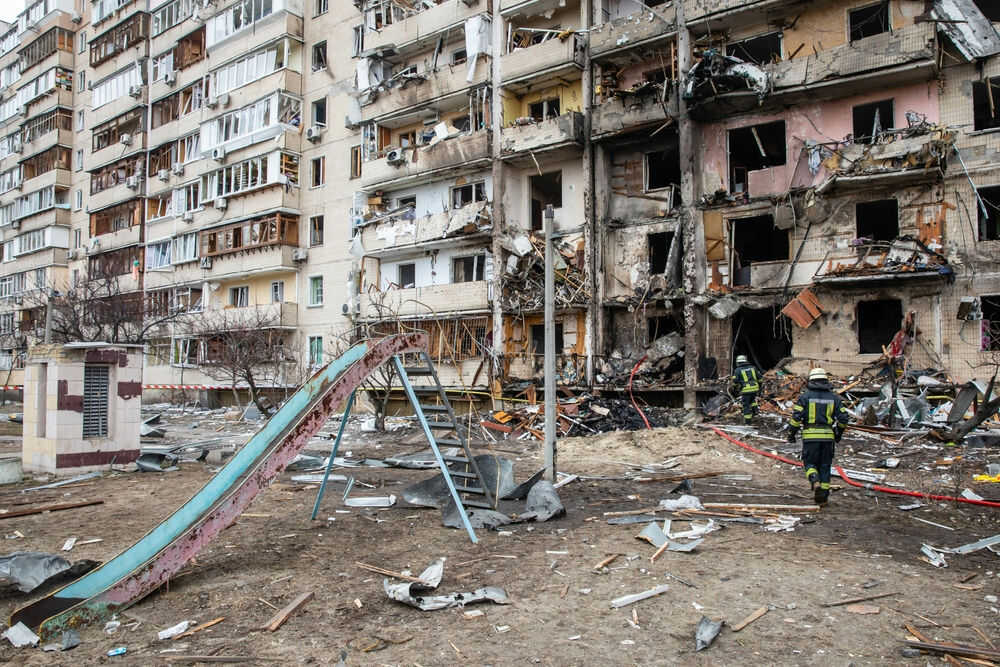🔴 Website 👉 https://u-s-news.com/
Telegram 👉 https://t.me/usnewscom_channel
(LibertySociety.com) – When a barrage of Russian missiles and drones ripped through central Kyiv, the world saw not just the deadliest attack on the city in months, but a calculated message broadcast in fire and terror to every capital watching the war’s next move.
Story Snapshot
- Deadliest Russian assault on Kyiv’s core since early 2025, with at least 15 dead and dozens wounded.
- Strikes targeted residential, educational, and diplomatic districts, challenging Ukraine’s air defenses and Western support.
- Attack coincided with stalled peace talks, raising pressure on global leaders to respond decisively.
- International embassies damaged, signaling escalation beyond military targets and deepening diplomatic stakes.
Kyiv’s Night of Devastation: The Anatomy of a Relentless Strike
Explosions shattered Kyiv’s August calm just after 9:30 p.m., as air raid sirens wailed and the city’s defenders scrambled to their posts. Residents, long familiar with the theatre of war, found themselves confronting an assault unlike any in months. The attack, a complex mix of Shahed drones, Kinzhal hypersonic missiles, and cruise projectiles, swarmed the city in waves through the night. Residential towers, a school, and at least three foreign diplomatic missions bore the brunt. For Kyiv’s citizens, the devastation was not just material; it was psychological, a calculated reminder of their vulnerability and the war’s refusal to fade into routine.
As rescue teams clawed through debris in the early dawn, Ukrainian officials confirmed 15 dead, including four children, and more than 48 wounded. Authorities warned that the toll would likely climb as hundreds of emergency workers raced the clock. Kyiv’s mayor, Vitali Klitschko, described the attack as the city’s darkest night in months, underscoring the trauma inflicted on families who, mere hours earlier, believed the city’s core to be relatively safe. The pattern was clear: Russia’s aim extended beyond military disruption, it was meant to inflict fear, disrupt daily life, and undermine the morale of a population already enduring years of conflict.
Escalation by Design: Timing and Targets as Political Messaging
This was no random volley. The timing, coinciding with the collapse of another round of U.S.-led peace efforts, suggests a deliberate strategy by Moscow. Ukrainian officials interpret the attack as a pointed rejection of diplomatic overtures, a signal that Russia will escalate rather than concede. The selection of targets, especially the embassies of Azerbaijan, the European Union, and the British Council, intensifies the message. Damaging diplomatic missions in central Kyiv amplifies the stakes, compelling foreign governments to reassess the risks to their own personnel and the costs of continued engagement.
Western-supplied air defenses intercepted most incoming projectiles, but the sheer volume overwhelmed even the city’s upgraded shield. The Ukrainian government seized the moment to renew calls for more sophisticated weaponry and tighter sanctions, arguing that the attack exposed both the brutality of Russia’s campaign and the gaps in Kyiv’s defensive capabilities.
Aftershocks: Human, Political, and Strategic Consequences
For the families sifting through the ruins of their homes and the diplomats surveying their shattered offices, the attack’s impact is immediate and personal. Trauma, displacement, and the sudden disruption of diplomatic activities ripple outward, fracturing the rhythm of daily life and international operations. Economically, Kyiv faces a steep bill for rebuilding infrastructure and expanding emergency services, while the psychological toll deepens a sense of collective fatigue and loss.
On the global stage, the attack’s repercussions are already reverberating. Calls for stronger sanctions and accelerated military aid to Ukraine have grown more urgent. Political leaders in Washington, Brussels, and beyond now confront the dilemma of how to deter further escalation without widening the conflict. Meanwhile, Russia’s official statements about peace are belied by its actions, fueling skepticism about Moscow’s true intentions and prompting renewed debate over the effectiveness of international pressure.
Expert Judgments and the Hard Road Forward
Military analysts are unanimous in their assessment: the attack showcased Russia’s ability to coordinate complex, mixed-method strikes despite years of sanctions and battlefield losses. For Ukraine, the event spotlights the ongoing vulnerability of even its best-defended cities and the limits of current Western support. Security experts warn that defending urban centers against swarms of drones and hypersonic missiles remains a formidable challenge, one that may only intensify as the war grinds on.
Humanitarian organizations, meanwhile, emphasize the growing need for psychological support and emergency relief as civilian casualties mount and social disruption deepens. Political scientists see the attack as part of a broader effort to erode Ukrainian resolve and force concessions at the negotiating table, an approach that risks prolonging the conflict and deepening international divisions. As the world watches Kyiv’s battered skyline, the open question remains: will the attack spark a decisive response, or become another tragic waypoint in a war with no clear end?
Copyright 2025, LibertySociety.com .
This content is courtesy of, and owned and copyrighted by, https://libertysociety.com and its author. This content is made available by use of the public RSS feed offered by the host site and is used for educational purposes only. If you are the author or represent the host site and would like this content removed now and in the future, please contact USSANews.com using the email address in the Contact page found in the website menu.
